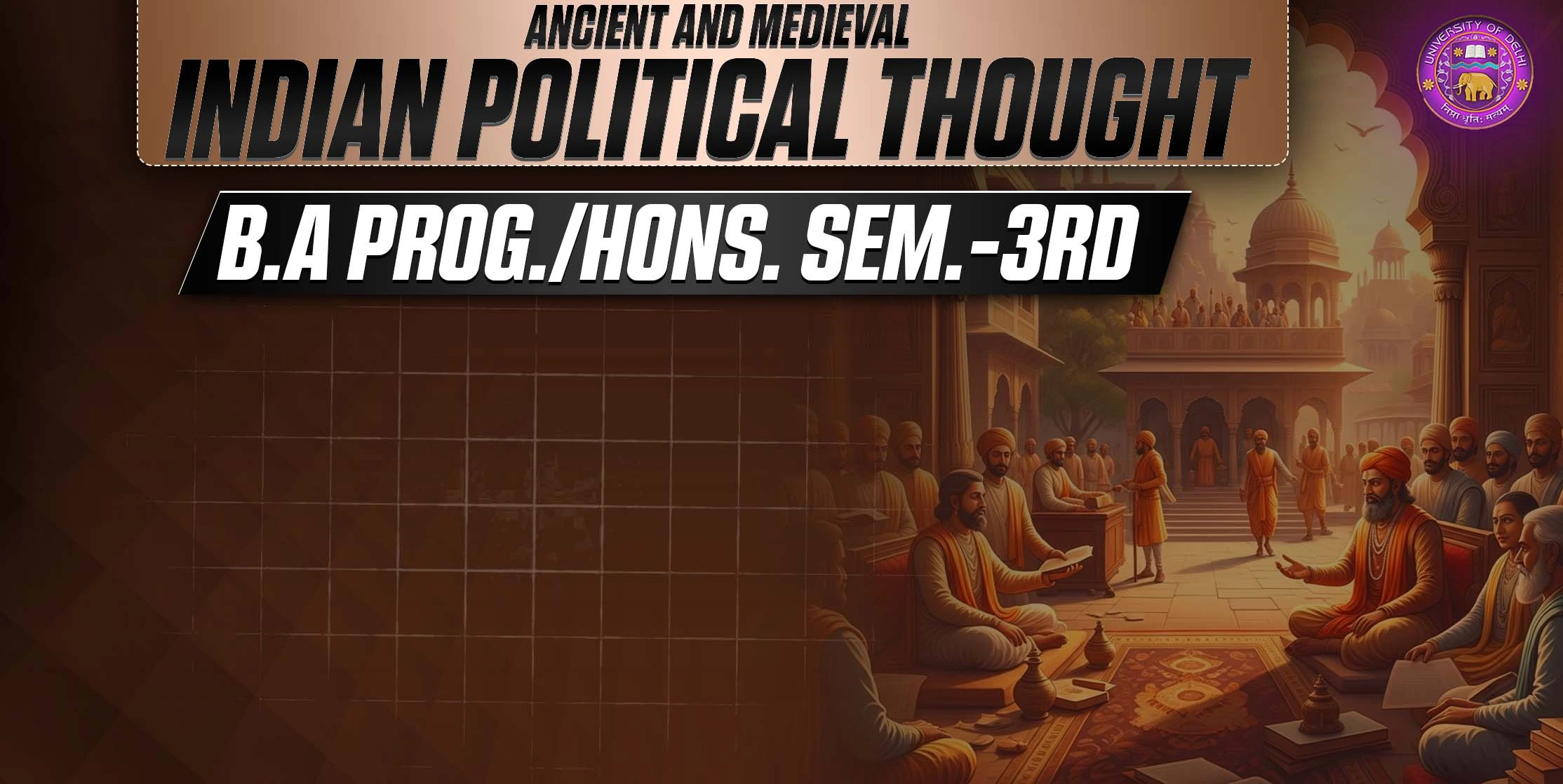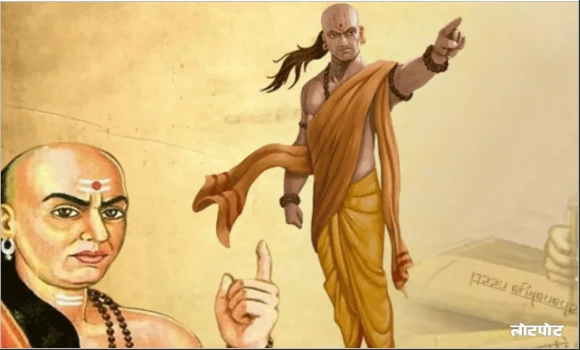
Get in Touch
We will get back to you within 24 hours.
Welcome to MVS Blog

Answer - Introduction
Indian thought has a glorious tradition in the field of political thought. India was called Vishwa Guru on the basis of its thought and philosophical ideas. Ancient Indian political thought meant how the state should be run, how society should be governed, and how systems of justice and security should be established. This thought was achieved through ancient texts and scriptures which provided guidance for political actions in ancient Indian society. Responsibility of the ruler, justice in society, and religious and moral values were an important part of it.
According to Dr. Om Nagpal, "Enough had been written on political science in India centuries before Plato and Aristotle. Aristotle's contemporary Kautilya, who can be called the father of realistic politics,, is a testimony to the fact that India was never behind anyone in the field of knowledge & science."
Development of Indian political thought:
The development of thought in India is considered to have started with the arrival of the Aryans. Its time ranges from 1600 to 1400 years BC. It is considered to start from the Vedic period till the Mughal period. The Vedas, Puranas, Upanishads of India are excellent examples of ancient Indian thought. Kautilya's Arthashastra is an ideal example of modern form of thought. The philosophy of Kautilya, a contemporary of Plato, is practical. Indian thought is not only practical but also extremely useful. The core of Indian thought is human and revolves around humans. Man became the center point in Western thought in the 18th century. Whereas it is present in Indian thought since the beginning. Indian thought is called by different names. Sometimes it is known as Rajdharma, Rajshastra, Dandaneeti and Nitishastra. In Panchatantra it was called Nripatantra.
Sources to know about Indian political thought:
For the convenience of study, the sources of Indian thought can be divided into the following parts-
Native or Indian source
1. Vedas – The oldest texts of Indian religious literature are the Vedas. It is in four parts which are Rigveda, Samaveda, Yajurveda and Yarthavveda etc. In these, the principles of governance and the origin of the state are revealed through the Vedas. It gives detailed information about the rights of the king, king-people relations and governance policies.
2. Brahmins and Upanishads - The gatha commentaries of Vedic mantras and codes are called Brahmins. Through the Upanishads, the contemporary society, government system, king-people relations are revealed.
3. Epics - After Vedic literature, two pillars of literature, Ramayana and Mahabharata, were composed. The credit goes to these epics for highlighting the ancient Indian social, political, economic, and cultural condition.
4. Puranas – Along with the epics, the Puranas provide historical material of their time. These are contemporaries of the epics. It mentions all the material from the primitive period to the Gupta period. From the political point of view, Agni Purana is of utmost importance in which public welfare has been described as the basis of governance.
5. Memories - Memories have special importance from the point of view of historical utility. The memories of Manu, Vishnu, Yajnavalkya, Narada, Brihaspati, Parashar, etc. are important. These are famous by the name of Dharmashastra. In these Smritis, there is a detailed description of general varnashram, religion, duties of the king, repentance etc.
6. Jain Literature - "Parishistha Parvan" written by Acharya Hemchandra is very important from the historical point of view in Jain literature. This book gives a detailed description of the Maurya period from the time of Mahavira.
7. Buddhist Literature - There are three main texts in Buddhism. Which is known as Tripataka. These include Sant Pitaka, Dhamma Pitaka and Vinay Pitaka etc. It contains a collection of Buddha's teachings. From this, knowledge of the then social, political, religious and economic system is obtained.

8. Kautilya's Arthashastra - Kautilya's Arthashastra was one of the major political texts not only of India but also of the world. It is considered the basis of political science. In "Arthashastra" the king was asked to study subjects like Vedas and philosophy etc. Is.
9. Ethics - After Kautilya, this is the most important among the texts written on state and governance. Kamdaniya Nitisara was written during the Gupta period around 500 AD. Shukraneeti also describes the then governance system. By this time, republics had come to an end, hence only the king is described in it. According to Shukra, the objective of governance is the all-round development of the people.
10. Other historical sources - Other historical sources include various works written in different periods. Rajatarangini written by Kalhan is prominent in this. It covers Kashmiri history from ancient times to the 12th century. Various aspects of Harsha's rule are described in "Harsha Charita" written by Banabhatta. Nandvansh and Mauryavansh are mentioned in Visakhadutt's play "Mudrarakshas". Chandvardai's work 'Prithviraj Raso' provides information about the then social and political situation.
Foreign Sources
The second important source for the study of Indian thought is called foreign sources. It mainly includes the thinkers of Greece and Rome. For convenience of study, Greek thinkers are also divided into three parts:-

1. Emphasis on spirituality
The state is considered the means to attain salvation. It is the state that implements such a system in the society which takes man towards salvation. India is called a spiritual country because India has been inclined towards spirituality since the beginning. India is called the spiritual teacher of the world. The approach taken here on every aspect of life has always been spiritual.
2. The king is not supreme
In ancient Indian political thought, the place of the king was very important but the king himself was not supreme. Despite giving a very high position to the king, he was not given the position of autocracy. The king was mainly restricted by religion.
3. Coordination of politics and religion
In ancient India, there is description of the mutual religion between the king and the people, the method of coronation, performing yagya by kings, appointment of priests, rituals of princes etc. These religious books not only describe what the king and the government should do and what they should not do, but also describe the duties of ministers, priests, generals, messengers, judges, employees and soldiers. Duty and religion are synonymous, that is why the ideas related to the state are inspired by religion.
4. Effect of social system
Every social system is the basis of political system. In ancient India, due to the division of the entire society into four varnas according to the varna system, the main function of the state was to protect this system and to keep every person in its respective class.
5. State is a necessary and useful institution
Ancient political thinkers supported the fact that having a state is very important and useful for social life. All the ancient political ideas believed that the three goals of life –religion, money and work – cannot be achieved without the state.
6. Importance of penal policy
According to Mahabharata and Manu, "Punishment is the ruler." Punishment is called religion because it keeps every person within his limits, punishment is the basis of the state. According to Kautilya, "Punal policy must be used judiciously. If this is not done, chaos and anarchy will spread in the state."
7. Religion supreme
One characteristic of Indian thought is that religion was considered supreme in ancient India. Indian thought neither considered the king to be an incarnation of God nor considered him arbitrary and autocratic nor did he consider him the source of law. Religion is considered paramount in Indian though. It is mandatory for the king to behave according to religion. If the king does not behave according to religion, then the people have every right to revolt against him.
8. People have the right to revolt
In Hindu scriptures, the people have been given the right to get rid of the tyrannical king by warning the king to change his behavior and if he does not change his behavior, then to warn him to leave the state. If the king's behavior does not change even after warning, then it is said in Shukra Niti that if the king does not improve even after this, he should be removed from the throne and a capable person from the royal family should be installed on the king's throne. Mahabharata even allows killing of the king if no solution is found.
Evaluation
Indian political thought is very ancient. Some scholars consider it to be more than five thousand years old. It is one of the oldest civilizations in the world. Although some western scholars 'covered such a lie in which it was proved that there was no ancient thought in India. Whatever it was, it does not stand in front of western thought. New researches and discoveries of the Archeology Department have proved that political thought has not only existed in India since ancient times but its level is also quite good.
Conclusion
In this way it becomes clear that the history of Indian thought is very ancient. It is considered to start from the Vedic period till the Islamic rule in India. Although the view of western critics regarding Indian thought has not been positive. Despite this, Indian thought is not only realistic but it is also modern to a great extent. Human beings are at the center of Indian thought. Whereas human is not Involved at the center of western thought.
0 Response